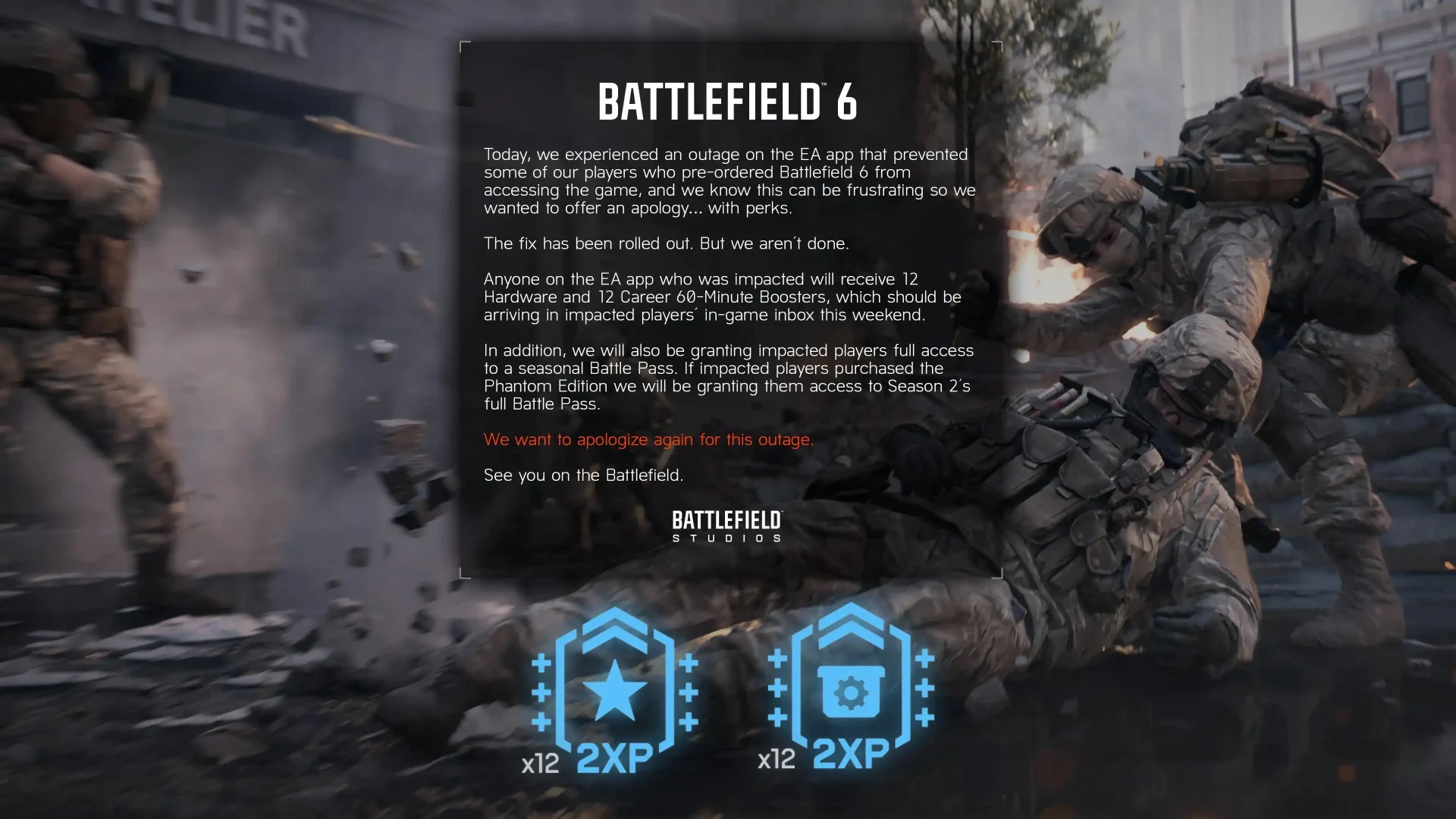EA has officially apologized for the chaotic launch of Battlefield 6, acknowledging the widespread login failures, server access issues, and entitlement errors that left many players unable to enter the game on day one. Reports flooded social media as the EA App displayed confusing “Purchase to Play” and “Game Not Released” messages, even for users who had already preloaded and purchased premium editions.
In a detailed statement, EA confirmed that the root of the chaos was a synchronization failure between the EA App and Battlefield servers. The company moved quickly to release fixes, compensation packages, and long-term backend improvements designed to restore stability and trust.
What Went Wrong
The heart of the problem lay in an entitlement desynchronization — essentially, the system responsible for verifying game ownership lost alignment between the EA App and Battlefield’s authentication servers. When those two systems disagreed, legitimate buyers were flagged as unauthorized.
The ripple effects were immediate:
- Steam users were hit with “Game not released” errors despite the official launch window already being live.
- EA App owners were told to “Purchase to Play” even after buying or preloading the game.
- Phantom Edition buyers suddenly lost access to campaign mode and exclusive content.
- Many players got trapped in endless authentication loops and frozen queues.

EA described the issue as a “platform validation error” — the EA App’s entitlement system simply couldn’t handle the volume of simultaneous global logins. When ownership verification failed to process in time, the platform defaulted to blocking access rather than granting temporary entry.
EA’s Response: Fixes and Compensation
EA’s leadership didn’t hesitate to take public responsibility for the failure. In the first 48 hours after launch, the company issued a series of emergency fixes aimed at stabilizing access and preventing further entitlement errors.
The first patch restructured how the EA App validates player tokens, clears cache data, and synchronizes edition ownership across storefronts. The infamous login loops were addressed by rewriting queue logic, reducing server congestion, and improving error handling under heavy load.
To compensate for lost playtime, EA announced a comprehensive goodwill package for affected players:
- Free Season 1 Battle Pass for all verified accounts.
- Bonus Season 2 Battle Pass for Phantom Edition owners.
- 12 Hardware Boosters and 12 Career Boosters automatically credited to every affected profile.
According to EA, all rewards will appear in players’ in-game inboxes within 48 hours of the deployment of Patch 1.0.1.0.
These gestures might not erase the frustration of the failed launch, but they show that EA is willing to take tangible steps toward accountability — not just empty promises.
Developer Statement
Vince Zampella, Head of the Battlefield franchise, publicly acknowledged the incident, describing it as “frustrating for everyone involved.” His message struck a tone of humility that resonated with the community. He confirmed ongoing work to strengthen the EA App’s reliability and offered practical advice for players still experiencing issues:
- Clear cache data in the EA App to eliminate corrupted session files.
- Reinstall the game via Steam or the EA App if problems persist.
- Relaunch the client after patching to refresh login tokens.
Zampella also reassured players that all purchased content, cosmetics, and progression data remain tied to verified accounts. No player will lose their unlocks or purchases because of the launch errors.
Understanding the Technical Failure
From a technical perspective, entitlement desynchronization is one of the most damaging types of launch bugs. When ownership validation systems fall out of sync, every part of the login flow — from token creation to cache management — can misfire.
A closer look at Battlefield 6’s issue reveals several intertwined causes:
- Stale cache validation. The EA App reused outdated ownership data instead of forcing a fresh check, leading to false “unowned” messages.
- Cross-storefront timing mismatches. Steam and EA App releases were not perfectly synchronized, causing premature “not released” states.
- Retry overload. Thousands of users hitting “Play” repeatedly created what engineers call a retry storm, overwhelming the login servers.
- Premium flag conflicts. Phantom and Deluxe editions added extra validation layers that increased the chance of mismatched entitlements.
Patch 1.0.1.0 directly targets these weak points. It reinforces cache integrity, enforces stricter token freshness, and synchronizes entitlement timing across all storefronts. EA’s engineers are also monitoring telemetry data to fine-tune server load balancing as player activity ramps up toward Season 1.
What Players Can Do Right Now
If you’re still struggling to log in or access content, EA recommends taking a few simple steps that have already resolved the problem for most users:
- Restart the launcher completely. Close the EA App or Steam and reopen it to force a clean token refresh.
- Clear the EA App cache via Settings → Help → App Recovery.
- Verify ownership in both your storefront library and the in-game “My Content” menu.
- Avoid spamming the login button. Wait a minute between attempts to prevent retry storms.
- Check your inbox for compensation items once the 48-hour window after Patch 1.0.1.0 has passed.
These steps are simple but effective, addressing the most common leftover symptoms of the launch-day bug.
Why It Matters
In a competitive multiplayer environment like Battlefield 6, lost launch time means far more than a simple inconvenience — it means falling behind the curve. Early access determines the pace of weapon unlocks, attachment progression, and tactical mastery. Players who missed the opening hours often find themselves at a disadvantage, facing opponents who have already optimized their loadouts and ranked up significantly.
By granting free Battle Passes and boosters, EA is essentially compressing the lost time for affected users. Those rewards help players regain parity with early adopters who managed to access the servers immediately. It’s a meaningful step that acknowledges the real cost of downtime in a live-service ecosystem — but for competitive players, it may not be enough on its own.
That’s where CarryLord can help.
CarryLord specializes in professional Battlefield 6 boosting services designed to close the gap quickly and efficiently. Whether you lost access during launch week or simply want to catch up before the first Battle Pass rotation, CarryLord’s team can assist with:
- Rank recovery to restore your standing and access higher-tier playlists faster.
- Weapon and attachment unlocks optimized around your preferred playstyle.
- Seasonal objective completion to help you maximize Battle Pass rewards and event milestones.
With expert boosters who understand Battlefield’s mechanics, CarryLord ensures that your account progression stays on track — so you can focus on gameplay, not recovery.
Recovery and Player Support
After the turbulent launch, many Battlefield 6 players found themselves not only behind on ranks and unlocks but also unsure how to efficiently recover their lost momentum. EA’s compensation package — with free Battle Passes and boosters — helps level the playing field, but it doesn’t replace the strategic edge that consistent early grinding provides. For competitive players, regaining rhythm and confidence matters just as much as restoring stats.
That’s why CarryLord has focused on guiding players through structured, intelligent recovery rather than just brute-force boosting. Instead of repeating early-game content, CarryLord helps users optimize what comes next — planning which objectives, weapons, and missions yield the best progression value after the initial chaos. The company’s specialists monitor ongoing patches, balance adjustments, and seasonal event timing, advising players on when to invest time, what to prioritize, and how to reach top performance without burning out.
This approach turns post-launch recovery into a process of growth, not frustration. Players who missed critical early hours can rebuild their momentum strategically — regaining both progress and competitive readiness before Season 1 begins. CarryLord’s role is no longer just about catching up; it’s about helping Battlefield 6 players stay ahead once they’re back in the fight.
The Road to Redemption
Despite its rocky start, EA’s response to the Battlefield 6 launch crisis marks a noticeable shift in how major studios handle large-scale technical failures. Instead of deflecting criticism or offering vague promises, the company communicated directly, acknowledged its mistakes, and delivered measurable fixes. That transparency helped rebuild confidence within a community that was on the verge of walking away.
But the apology alone isn’t enough. The true test will come with Season 1, when the player base once again floods the servers. EA must prove that its backend can withstand peak loads and that entitlement validation — the very system that caused the meltdown — can now function seamlessly under stress. Continuous telemetry monitoring, faster patch delivery, and a proactive QA pipeline will determine whether Battlefield 6’s stability holds.
Rebuilding trust also depends on sustained engagement. Players expect regular updates, meaningful balance patches, and visible communication from the developers. EA has already shown that it can act fast when things go wrong; now it needs to show it can maintain that same responsiveness in a stable environment.
If the company stays consistent, Battlefield 6 could transform from a launch disaster into a comeback story — one defined by accountability, adaptation, and long-term player support. For the Battlefield community, it would be a rare example of a publisher learning from its mistakes and improving because of them.
In the end, the success of Battlefield 6 will depend not just on EA’s technical execution but on how well it nurtures the player experience over time. With the right mix of transparency, stability, and community-driven solutions — including the support of recovery experts like CarryLord — the franchise has a real chance to turn early failure into enduring success.











